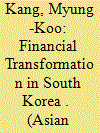| Srl | Item |
| 1 |
ID:
160454


|
|
|
|
|
| Summary/Abstract |
This paper addresses why and how South Korea’s financial system has diverged drastically from the Japanese model since the early 1980s and has turned to the US model, which is often regarded as a more market-oriented financial system. The paper traces the rise of American-trained Korean economists in the Economic Planning Board and their collaboration with other such economists in public and private economic institutes and academia.
|
|
|
|
|
|
|
|
|
|
|
|
|
|
|
|
| 2 |
ID:
131885


|
|
|
|
|
| Publication |
2014.
|
| Summary/Abstract |
This article explores why the Japanese government did not decisively intervene on behalf of bank bailouts at the early stage of the banking crisis of 1997-98 and investigates the institutional and political context behind the use of fiscal money for bank bailouts in 1997-98, 1998-99, and 2001-05. In contrast with prevailing views, which emphasize the conflicts of interest or differences in policy preferences between politicians and bureaucrats and their captured nature either by bankers' special interests or political/bureaucratic interests, this article argues that Japanese policymakers shared a congruent policy preference - that is, minimizing the disruptions in the existing institutional arrangement in government-bank-firm relations and this congruence in policy preference (or 'cognitive capture') compelled the government to take a creditor-centered approach to the banking problem - i.e., letting banks resolve their own problems. It also argues that a strong political leadership that can break with the 'cognitive capture' and sustain government's resolute commitment to solving the nonperforming loan problem is an essential factor for successful bank restructuring.
|
|
|
|
|
|
|
|
|
|
|
|
|
|
|
|
| 3 |
ID:
088389


|
|
|
|
|
| Publication |
2009.
|
| Summary/Abstract |
This paper explores the sequence, pace, and emerging outcomes of bank restructuring in South Korea since the financial crisis in late 1997, paying special attention to the state intervention pattern in regard to resolving non-performing loans and privatizing temporarily nationalized banks by foreign selling.
|
|
|
|
|
|
|
|
|
|
|
|
|
|
|
|